UNHCR statement on the Forgotten Children Report
UNHCR statement on the Forgotten Children Report
UNHCR Statement on The Forgotten Children: National Inquiry into Children in Immigration Detention 2014
UNHCR considers that the detention of people seeking protection should be a measure of last resort. Where it is used, it must be subject to independent monitoring and inspection by international, regional and/or national monitoring and oversight bodies.
Seeking asylum is not illegal, and respecting the right to seek asylum includes provision of humane reception arrangements for asylum-seekers. The fundamental right to liberty and the prohibition of arbitrary detention applies to all people regardless of their immigration or other status.
UNHCR in 2012 issued new Guidelines relating to the detention of asylumseekers and in 2014 launched a new global five-year initiative aimed at helping countries move away from the detention of asylum-seekers, refugees and stateless people worldwide.
The new intiative, Beyond Detention, called firstly for an end to the detention of children, secondly for alternatives to detention to be available in law and in practice, and thirdly for conditions of detention - when unavoidable - to fully meet international human rights standards. Independent scrutiny by oversight bodies is essential to meeting these aims.
The Forgotten Children: National Inquiry into Children in Immigration Detention 2014 report by the Australian Human Rights Commission, which was tabled by the Australian Parliament on 11 February 2015, reaffirms that the detention of asylum-seekers, refugees and stateless persons causes unnecessary suffering, with often serious consequences, in particular when people are held for long periods. It is an important reminder that, for children, the effects are particularly serious because of the effect detention can have on their physical, emotional and psychological development, even if they are not separated from their families.
UNHCR has welcomed moves by successive Australian governments to reduce the number of children who are in detention and to implement alternatives to detention, and supports further progress in this regard.
In the case of Nauru, UNHCR welcomes indications that the Governments of Nauru and Australia will move towards an open reception centre for family groups and children in Nauru. At the same time, longstanding and wellknown concerns remain about the transfer of asylum-seekers from Australia to Nauru, and the significant shortcomings in the reception arrangements, particularly for children.







